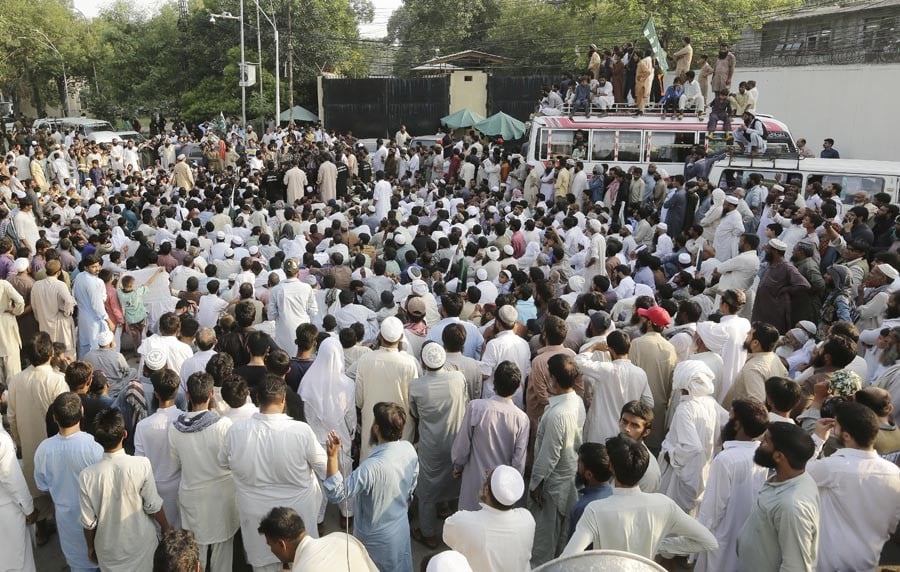
Protests outside the Lahore Press Club on Shimla Pahari Chowk routinely cause traffic gridlocks. The government plans to redesign it but offers no timeline

The Shimla Pahari Chowk is a central location in Lahore, and receives a great deal of vehicular traffic, both heavy and light, all through the day. The Chowk also serves as a hub for commuters heading towards the Mall Road and beyond, Railway Station, Davis Rd, Canal Rd, the northern part of the city, and other areas. Its importance cannot be downplayed because there is hardly any option for the people to avoid this route. If you attempt to do so, chances are you will get stuck somewhere (on the alternative route). Eventually, you return to this place, having wasted a lot of time.
Unfortunately, over time, the said Chowk has become a nuisance for commuters. The reason: Most of the time it is clogged. Home to the Lahore Press Club (LPC), the Chowk has different individuals and groups routinely gathering here, and holding protest demonstrations against the rulers or any public or private enterprise, believing fully well that this one ‘venue’ shall get them instant coverage in the mass media.
The protesters do not seem to realise that they cause great inconvenience to the general public. Or, perhaps, this is their way of getting noticed.
While some protesters stay on one side of the road, the others literally block the entire stretch for long hours, without showing any concern for the poor commuters hopelessly stuck at the juncture.
The district government and police are clearly unable to help the situation.
Abdullah Malik, a human rights activist, is of the view that the protesters "choose this spot because they know that the media personnel are around." The trend, he argues, increased following the boom of electronic media -- "The people can now carry their message across in real time also.
"Often, the protesters insist that they shall disperse only if they are ensured footage on TV channels. Besides, they feel safe around this place because they believe the police shall not be able to harm them in the presence of media.
"Another reason could be that there’s a ban on holding protests on the Mall Road and other places in the city that used to be popular venues for that."
Malik further says that no protester seeks permission from the government for grouping at the Chowk. "They do so only when they intend to hold a full-fledged demonstration."
Shimla Pahari Chowk is one of the busiest in the city. Here, you can meet clerics, members of religious and sectarian groups, students, labourers, social activists, victims of police torture, and so on, any day of the week. Of course, protests are a democratic right of the people but they shouldn’t come at the expense of other people’s convenience.
Naila, a student of Queen Mary College, says the location is "a curse for us. We get stuck in traffic jams every other day, because there’s a protest happening there. Our college van has difficulty crossing the road. I sometimes can’t get off [the van] because of the mad rush. I fear being misbehaved. This often goes on for a long time. But we can’t seem to avoid it."
She exhorts the government to construct an underpass to help ease the traffic overflow. "Or, shift the LPC to some place else, please!"
She says that the freedom to raise their voice comes at the cost of other people’s freedom to move. "Come to think of it, such traffic gridlocks can also cause some serious fatalities if you have an ambulance in the middle and you can’t make way for it."
Imran Maqbool, a spokesperson for the City District Government Lahore (CDGL), says the protesters gathered outside the LPC do not file any application seeking permission to stage a protest; they just descend on the venue and begin to crowd the place.
He makes it clear that "no suggestion of construction of an underpass around the Lahore Press Club is under discussion."
Hammad Raza, a spokesman for DIG Operations and Chief Traffic Officer, Lahore, believes that the police try their best to ensure a smooth flow of traffic and facilitate commuters. "We make diversion plans instantly and send traffic wardens to the spot without delay. Some wardens are deployed at the place already."
According to Raza, the protesters never seek permission to hold demonstrations. "They are provided security because they are vulnerable. The [police] department has prior information [of the protests], thanks to intelligence reports. But we cannot always stop them. So we instead try and maintain law and order situation. "It must be remembered that we are fighting a war against terrorism. The police is very busy in making your city secure, and torturing peaceful protesters is the last thing they would do," he declares.
Raza claims that the traffic police had a meeting with the government on redesigning the Chowk. "We believe this is necessary, as the adjoining areas and roads are quite narrow."
On the other end of the spectrum, Majeed Sajid, Secretary, Lahore Press Club, says no one ought to be deprived of their fundamental rights, hence "we do not stop the protesters. If a large number of people gather outside the LPC, we call the police for our security as the journalist community is the most vulnerable today."
Sajid says the journalists visiting the LPC also suffer and sometimes can’t find parking space for their vehicles. The administration of the LPC does not allow anyone to protest in front of the main gate of the club, "If they do so, we deny them coverage in the media, and call the police. The protesters are told to stand a few steps away from the LPC gate."
Sajid also says that ensuring a smooth flow of traffic is the responsibility of the concerned departments, and they must be held accountable.